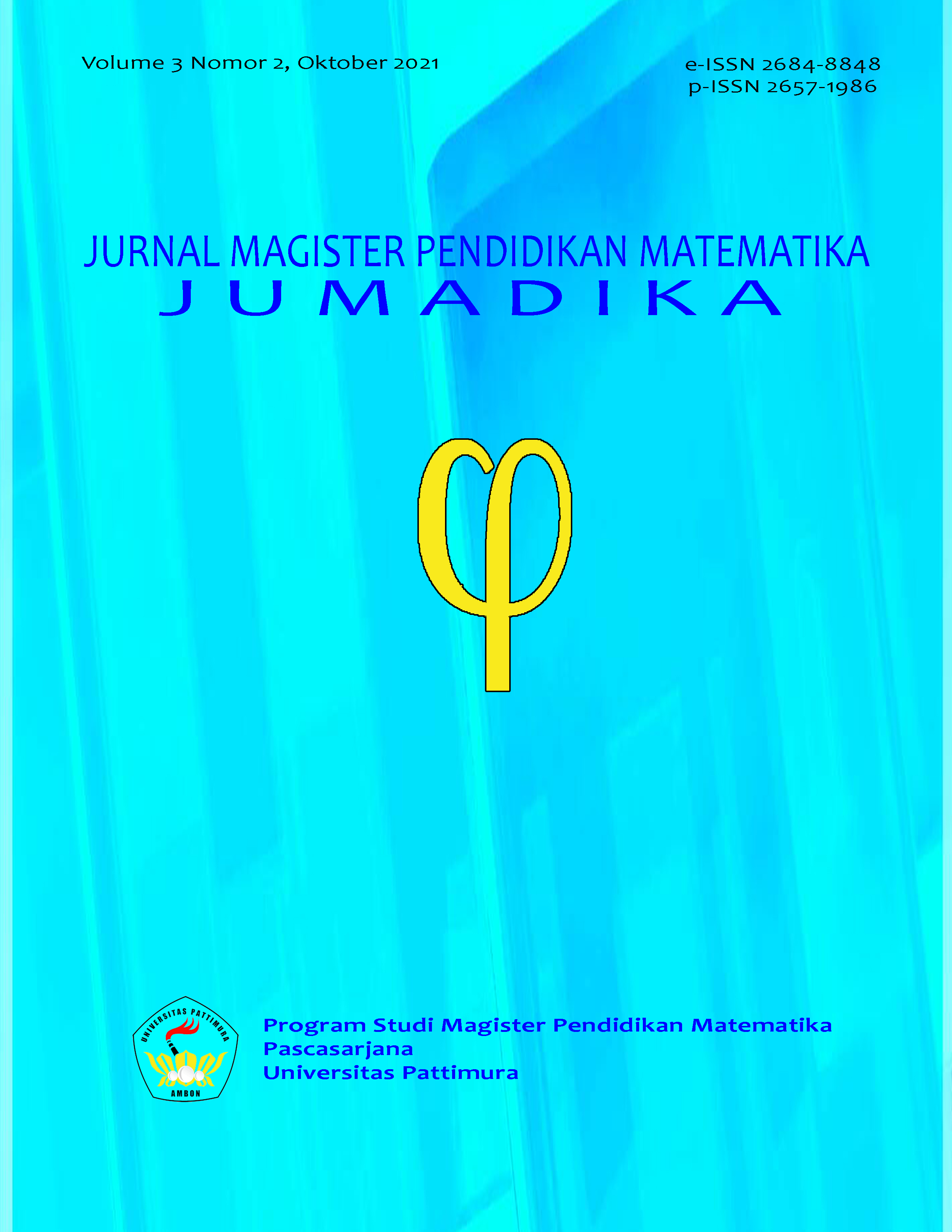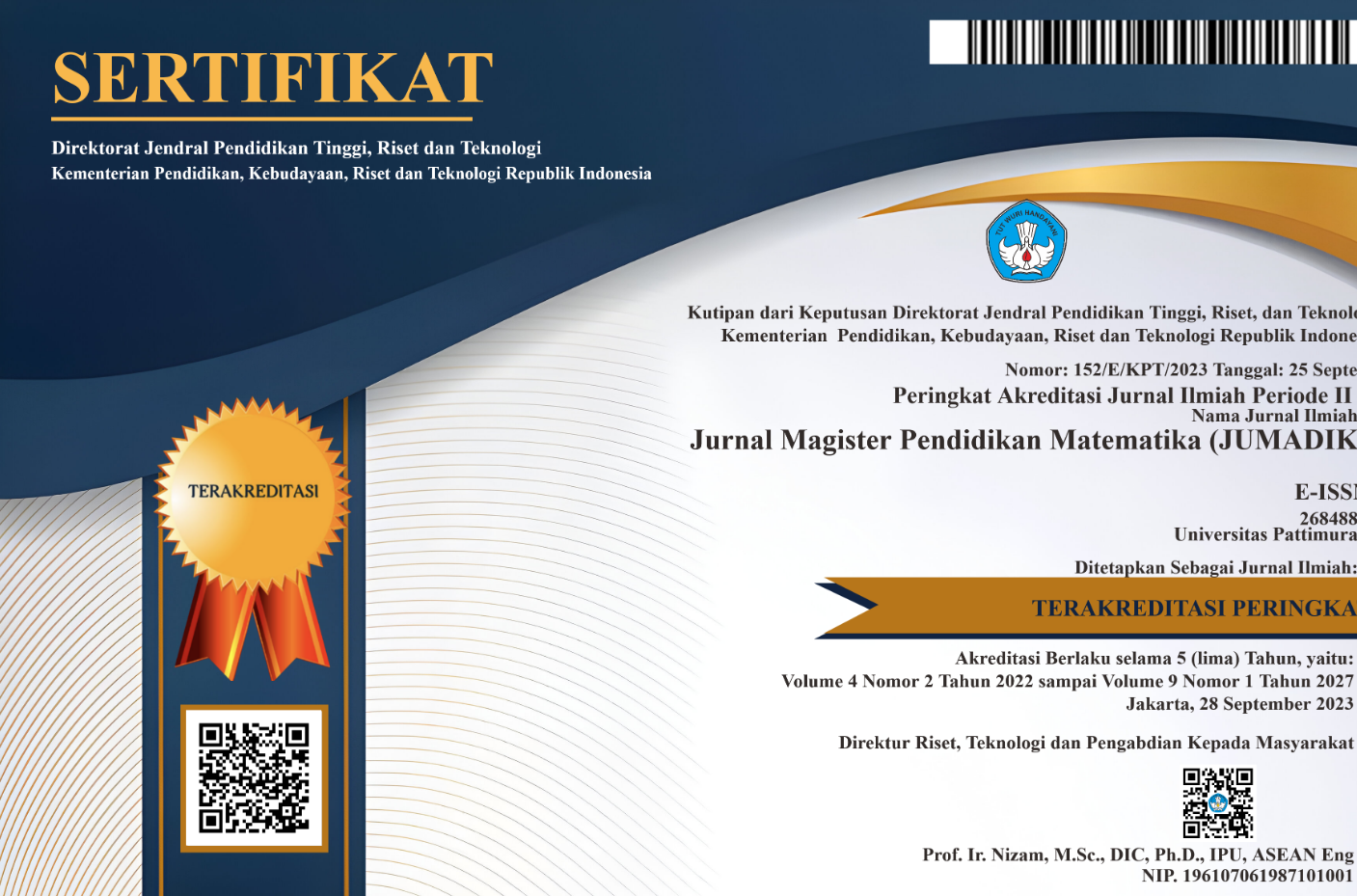ANALYSIS ON STUDENTS’ MATHEMATICS ACHIEVEMENT BASED ON LEARNING STYLES
Abstract
This descriptive and comparative study aims to see the students learning styles and mathematics achievements. The respondent are fifty junior high school students in Lembang, West Bandung, Indonesia. The research instruments are Perceptual Learning Style Preference Questionnaire (PLSPQ) and mathematics problem solving test. The result of this study are: (1) Only twenty percent of the students have exactly one learning style and most of the students has kinesthetic learning style; (2) Students who have three or less major learning styles perform good mathematics achievement, and students who have minor learning styles only, perform better mathematics achievements averagely, comparing with students who have major learning styles; (3) Students perform better mathematics achievement when they have more than one learning style, (4) There is no significant difference in the students’ mathematics achievement, between students who have three or less major learning styles and students who have more than three major learning styles.
Downloads
References
Arifin, Z. (2015). Analyzing the Learning Styles of Junior High School Students and the Implication To English Teaching: a Case Study At Smpn I Dagangan Madiun. Jurnal Penelitian Humaniora, 16(1), 48–54.
Bosman, A., & Schulze, S. (2018). Learning style preferences and mathematics achievement of secondary school learners. South African Journal of Education, 38(1), 1–8. https://doi.org/10.15700/saje.v38n1a1440
Çalışkan, H., & Kılınç, G. (2012). The Relationship Between the Learning Styles of Students and Their Attitudes Towards Social Studies Course. Procedia - Social and Behavioral Sciences, 55, 47–56. https://doi.org/10.1016/j.sbspro.2012.09.476
Jhaish, M. A. (2010). Deanery of Graduate Studies College of Education English Methods Department The Relationship among Learning Styles, Language Learning Strategies, and the Academic Achievement among the English Majors at Al-Aqsa University Mohammed Ashour Jhaish.
Muhtar, S. N. (2001). a Study of Learning Style Preferences of All Female Students in University Level . 35–46.
Mursari, C. (2020). Deskripsi Kemampuan Berikir Kritis Matematis dan Kemandirian Belajar Siswa Ditinjau dari Gaya Belajar. AlphaMath : Journal of Mathematics Education, 5(2), 40. https://doi.org/10.30595/alphamath.v5i2.7345
Nurhayati. (2014). Meningkatkan Hasil Belajar Siswa Dengan Menggunakan Metode Bimbingan Mata Pelajaran IPA di Kelas III SD Inpres 1 Bainaa. Jurnal Kreatif Tadulako Online, 4(10), 1–11.
Övez, F. T. D., & Uyangör, S. M. (2016). The Effect of the Match between the Learning and Teaching Styles of Secondary School Mathematics Teachers on Students’ Achievement. Journal of Education and Practice, 7(29), 125–132. https://doi.org/10.7176/jep/7-29-4
Rahman, A., & Ahmar, A. (2017). Relationship between learning styles and learning achievement in mathematics based on genders. World Transactions on Engineering and Technology Education, 15(1).
Reid, J. O. Y. M. (1987). of ESL Students. Tesol Quarterly, 21(1), 87–110. https://doi.org/10.2307/3586356
Saija, L. M. (2012). Analyzing the Mathematical Disposition and Its Correlation With Mathematics Achievement of Abstract Senior High School Students. Infinity Journal, 1(2), 148. https://doi.org/10.22460/infinity.v1i2.13
Saija, L. M. (2020). Analisis Terhadap Gaya Belajar Siswa Sekolah Menengah Di Bandung. Jurnal Padegogik, 3(1), 57–70.
Syukur, M., Misu, L. (2014). Jurnal Penelitian Pendidikan Matematika Volume 2 No. 3 September 2014. 2(3), 1–16.
Wassahua, S. (2016). Analisis Gaya Belajar Siswa Terhadap Hasil Belajar Matematika Pada Materi Himpunan Siswa Kelas Vii Smp Negeri Karang Jaya Kecamatan Namlea Kabupaten Buru. Jurnal Matematika Dan Pembelajarannya, 2(1), 105–126. https://doi.org/http://dx.doi.org/10.33477/mp.v4i1.310
Willia, A., Annurwanda, P., & Friantini, R. N. (2020). Proses Pemecahan Masalah Matematika Ditinjau dari Gaya Belajar Siswa. AlphaMath : Journal of Mathematics Education, 6(2), 116. https://doi.org/10.30595/alphamath.v6i2.8165
Copyright (c) 2021 Louise M Saija

This work is licensed under a Creative Commons Attribution-NonCommercial-ShareAlike 4.0 International License.
License and Copyright Agreement
In submitting the manuscript to the journal, the authors certify that:
- They are authorized by their co-authors to enter into these arrangements.
- The work described has not been formally published before, except in the form of an abstract or as part of a published lecture, review, thesis, or overlay journal. Please also carefully read Jurnal Magister Pendidikan Matematika (JUMADIKA) Posting Your Article Policy.
- That it is not under consideration for publication elsewhere,
- That its publication has been approved by all the author(s) and by the responsible authorities – tacitly or explicitly – of the institutes where the work has been carried out.
- They secure the right to reproduce any material that has already been published or copyrighted elsewhere.
- They agree to the following license and copyright agreement.
Copyright
Authors who publish with Jurnal Magister Pendidikan Matematika (JUMADIKA) agree to the following terms:
- Authors retain copyright and grant the journal right of first publication with the work simultaneously licensed under a Creative Commons Attribution-NonCommercial-ShareAlike 4.0 International License (http://creativecommons.org/licenses/by-nc-sa/4.0/) that allows others to share the work with an acknowledgment of the work's authorship and initial publication in this journal.
- Authors are able to enter into separate, additional contractual arrangements for the non-exclusive distribution of the journal's published version of the work (e.g., post it to an institutional repository or publish it in a book), with an acknowledgment of its initial publication in this journal.
- Authors are permitted and encouraged to post their work online (e.g., in institutional repositories or on their website) prior to and during the submission process, as it can lead to productive exchanges, as well as earlier and greater citation of published work.








